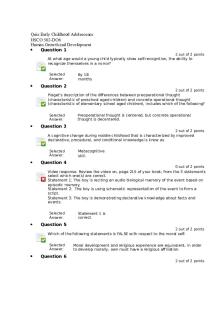Pedagogical Leadership in Early Childhood PDF

| Title | Pedagogical Leadership in Early Childhood |
|---|---|
| Author | Chertarnia Roberts |
| Course | Critical Reflection on Leadership of Practice in Early Childhood |
| Institution | University of East London |
| Pages | 2 |
| File Size | 62.2 KB |
| File Type | |
| Total Downloads | 63 |
| Total Views | 135 |
Summary
Taught by Gemma Ryder...
Description
Pedagogical Leadership in Early Childhood Definitions - Pedagogy - Defined as the art and science of teaching and learning (one's own style of teaching is subjective). - Curriculum - Any programme or plan of activities - Pedagogical leadership is concerned with learning in general. - How children learn and how you can teach them - also how you shape and form your style of teaching. - ‘Forms of practice that shape and form teaching and learning and how these can be integrated within leadership’. - ‘A more effective alternative to bureaucratic, visionary and entrepreneurial leadership in improving schools.’ The Early Years Professional Status and Early Years Teacher Status - New Labour's drive to produce a graduate - led workforce in England’s early years. - Emphasis was on developing pedagogical leaders to lead the Early Years Foundation Stage for the 0-5 year groups. - Concerns raised by both the early childhood and education sectors regarding the marketisation of the programme, understanding of the role and disparities between the (eventual) use of the term ‘early childhood teacher’ and career progression. - The term ‘social pedagogue’ was initially considered as a possible name for a early childhood graduate award, however concerns were raised about whether the term would be understood. - Social pedagogies in parts of Europe work across a much wider age grop, including youth and the elderly.
Definition of Pedagogy: An Alternative - Palaiologou explores an alternative approach to the definition of pedagogy - recent concept. - They extend it beyond the relationship between teacher and learner. - Social axes are used to recognize the needs of learners within an internal or external environment. - Internal axes - Values, beliefs, culture, religion, customs and local economy. - External ases - Social values, global economy, mass media, social networking, information, communication, technologies, national curriculum, the ‘academic press’ of student test scores. Other Models of Pedagogical Leadership - Working with teacher capacity and the instructional care of schooling (in classrooms). - Working with factors, (e.g.) setting directions, expressing high expectation and communication of teacher activities. - Student performance and school results. - The study centred around school principles, as they are expected to enhance student learning and improve outcomes. - Consideration is given to classroom observations as a means of actively working as a pedagogical leader.
- Knowledge (theory) and practice provided as strategies could be used. - Challenge related to pedagogical leadership described generally in policy. - The authors conclude there are no one ‘best’ pedagogical leadership practice....
Similar Free PDFs

Transition in early childhood
- 4 Pages

ICT in Early Childhood Education
- 3 Pages

Early Childhood Case Study
- 10 Pages

Andres Bonifacio Early Childhood
- 12 Pages

Quiz Early Childhood Adolescence
- 9 Pages

Early Childhood project
- 4 Pages

Psych 208 Early Childhood Notes
- 9 Pages

Early Childhood Education quiz 1
- 5 Pages
Popular Institutions
- Tinajero National High School - Annex
- Politeknik Caltex Riau
- Yokohama City University
- SGT University
- University of Al-Qadisiyah
- Divine Word College of Vigan
- Techniek College Rotterdam
- Universidade de Santiago
- Universiti Teknologi MARA Cawangan Johor Kampus Pasir Gudang
- Poltekkes Kemenkes Yogyakarta
- Baguio City National High School
- Colegio san marcos
- preparatoria uno
- Centro de Bachillerato Tecnológico Industrial y de Servicios No. 107
- Dalian Maritime University
- Quang Trung Secondary School
- Colegio Tecnológico en Informática
- Corporación Regional de Educación Superior
- Grupo CEDVA
- Dar Al Uloom University
- Centro de Estudios Preuniversitarios de la Universidad Nacional de Ingeniería
- 上智大学
- Aakash International School, Nuna Majara
- San Felipe Neri Catholic School
- Kang Chiao International School - New Taipei City
- Misamis Occidental National High School
- Institución Educativa Escuela Normal Juan Ladrilleros
- Kolehiyo ng Pantukan
- Batanes State College
- Instituto Continental
- Sekolah Menengah Kejuruan Kesehatan Kaltara (Tarakan)
- Colegio de La Inmaculada Concepcion - Cebu







